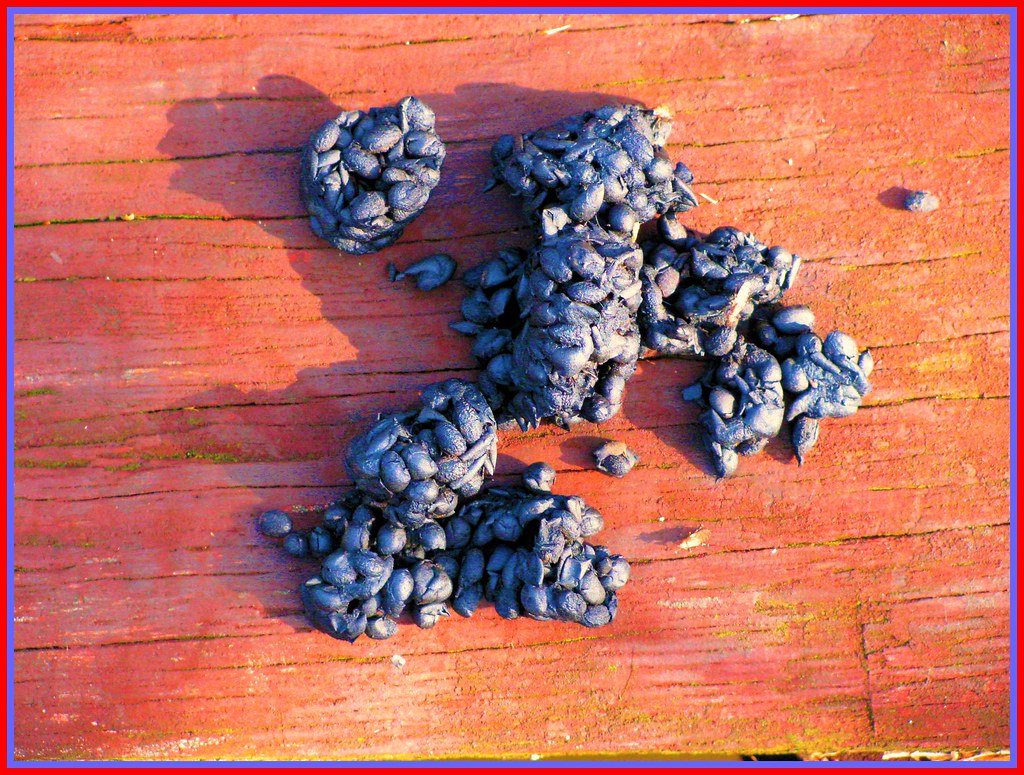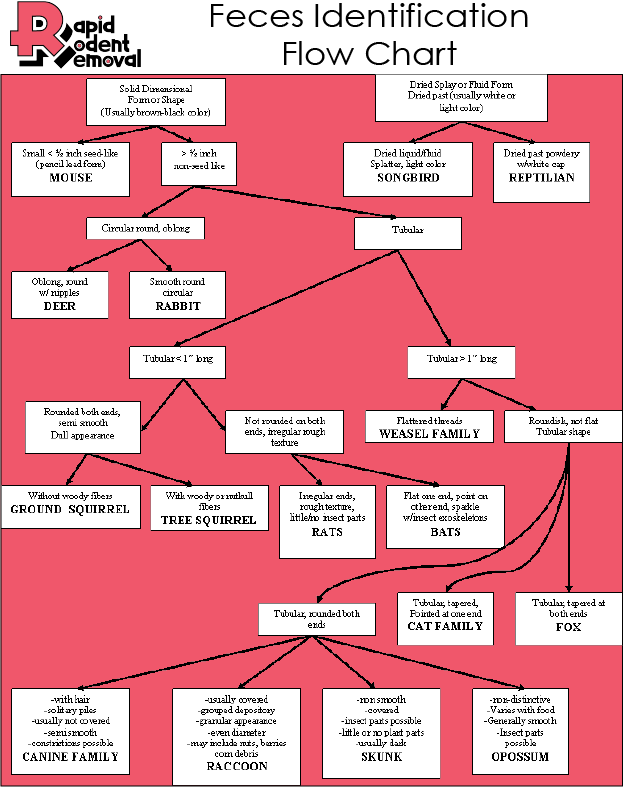What does Raccoon Poop look like & is it harmful to be around ?
Pictures of droppings, diseases and what you need to know !
WHAT DOES RACCOON POOP LOOK LIKE ?
Raccoon Poop is usually about 2 to 3 inches long and half an inch in diameter, and they tend to be tubular in shape. The color of raccoon poop can vary, but it is usually dark, due to the fact that raccoons have a diet that is high in plant material. The feces may also contain undigested seeds, berries, and other plant matter. Raccoon poop may also have a strong, musky odor.
How do i know whether or not this poop is indeed raccoon poop and not opossum, squirrel, or rat feces ?
How can i tell if the animal droppings in my attic are Raccoon droppings ?
raccoon poop VS OPOSSUM POOP :
let's go over raccoon poop and its main characteristics
determine if it is indeed a raccoon based on the poop
Raccoon Poop
Opossum Poop
Does raccoon poop cause any health risk or disease concerns?
do you know When raccoon poop is dangerous?
In rare cases, the droppings can contain rabies (if the raccoon is infected), click here for raccoon sounds but they can also contain viruses like canine distemper that affect your pets. If a raccoon is infected with canine distemper, it’s behaviour will change. When you see a raccoon out and foraging for food during the daytime and acting aggressively towards other animals or humans it might have this illness. You should call a Raccoon Removal professional.
Raccoon feces can contain a variety of parasites and disease-causing bacteria that can
be transmitted to humans through contact with the feces or through accidental
ingestion. Some of the diseases that may be transmitted through raccoon feces include:
1. Roundworm: Raccoons can carry a type of roundworm called Baylisascaris
procyonis, which can cause a rare disease called baylisascariasis in humans.
This disease can be transmitted to humans through accidental ingestion of
raccoon feces that contain the roundworm eggs.
2. Leptospirosis: This is a bacterial disease that can be transmitted to humans
through contact with raccoon urine or feces.
3. Rabies: Raccoons can carry rabies, a viral disease that affects the nervous
system. Rabies can be transmitted to humans through a bite or scratch from an
infected raccoon.
4. Other bacterial infections: Raccoon feces may contain other types of bacteria
that can cause infections in humans.
read our feces identification chart for other animal feces .
what does rat poop look like ?
what does squirrel poop look like ?
what does raccoon poop look like ?
what does opossum poop look like ?
If your dog is digging around in your yard and ingests some of the droppings, your dog can become very sick.
The most severe threat about raccoon feces, though, is that raccoons are known to be the primary carrier for a parasite called Baylisascaris procyonis. This parasite is a type of roundworm that causes a severe condition for humans. For children or those with compromised immune systems, this kind of parasite can prove to be fatal. The roundworms can only survive when attached to an animal host, but the eggs are very tough and can withstand years in soil and still be viable. People may come into contact with old, decomposed raccoon feces without even knowing it.
Raccon poop, Do you know how to deal with it ?
First and foremost is a Warning: Don’t ever touch wildlife feces with your bare hands! One of the reasons having wildlife living on your property is dangerous is due to the feces and urine. It carries many diseases that can spread to pets and humans and come with some serious side effects. Use a stick, or put on gloves before touching any feces. Also, some of these diseases are airborne which means you can inhale them, so it’d be prudent to wear a mask when you don’t know what you’re dealing with!
raccoon poop may resemble opossum poop, but the dead giveaway is the food fragments in the stool. Fruits, herbs, vegetables, nuts, and grains are what raccoons primarily eat, which means these undigested things will undoubtedly be present in their feces.
Raccoon poop is probably not harmful, Neither is Raccoon Feces
Despite what we might want to think, most of us come in to contact with raccoon (and other rodents) droppings pretty frequently. Most of the time, it is completely harmless as the quantity we’ve be exposed to isn’t enough to hurt us or make us sick in any way. In rare cases, though, if the raccoon is ill or has ingested some poison, it can transfer to humans and make us very sick. of course that’s different if its in your attic, especially if your airducts are exposed.
reposted below from the cdc
https://www.cdc.gov/parasites/baylisascaris/resources/raccoonlatrines.pdf
What diseases can you get from raccoon poop ?
What is a raccoon latrine?
Raccoons defecate in communal sites, called latrines. Raccoon feces usually are
dark and tubular and have a pungent odor. Latrines may be found at or on:
• trees (around the base and at forks)
• raised horizontal surfaces (such as fallen logs, stumps, woodpiles, or large rocks)
• decks or patios
• attics
• garages
Raccoon Latrines: Identification and Clean-up
Why are raccoon latrines dangerous?
Raccoons are the primary host of Baylisascaris procyonis, a roundworm that can be harmful to people. Roundworm eggs
are passed in the feces of infected raccoons, and people become infected by ingesting eggs. Anyone who is exposed to
environments where raccoons frequent is potentially at risk. Young children or developmentally disabled persons are at
highest risk for infection as they may be more likely to put contaminated fingers, soil, or objects into their mouths.
What do I do if I find a raccoon latrine?
If you have found a raccoon latrine in or near your home, cleaning the area may prevent possible infection. Eggs in newly
deposited feces are not infectious and take at least 2–4 weeks to become infective. Prompt removal and destruction of
raccoon feces will reduce risk for exposure and possible infection.
If you choose to clean the site yourself, here are some tips to assist you:
Preparation
• Take care to avoid contaminating hands and clothes.
• Wear disposable gloves.
• Wear rubber boots that can be scrubbed or cover your shoes with disposable booties that can
be thrown away, so that you do not bring eggs into your household.
• Wear a N95-rated respirator (available at local hardware stores) if working in a confined space
to prevent accidental ingestion of eggs or other harmful materials.
(Note: Although inhalation of roundworm eggs has not been shown to result in Baylisascaris infection, wearing a N95-rated
respirator will protect you from possible exposure to aerosolized eggs and is recommended for cleanup of raccoon latrines in
confined spaces to prevent the inhalation of fungal spores, bacteria, or viruses that may be present.)
Outdoor Latrine Cleaning
• Feces and material contaminated with raccoon feces should
be removed (using a shovel or inverted plastic bag) and
burned, buried, or bagged and placed in the trash to be sent
to a landfill.
• Most chemicals do not kill roundworm eggs, but heat will kill
the eggs instantly. Treat feces-soiled decks, patios, and other
surfaces with boiling water or a propane torch.**
• Disinfect hard, smooth surfaces (including shovel blades)
with boiling water.
• To help further reduce the risk of possible infection, wash
your hands well with soap and warm running water. Clean/
launder your clothes thoroughly using hot water and
detergent.
Indoor Latrine Cleaning
• To avoid stirring up dust and debris, lightly mist the latrine
area with a little water from a spray bottle.
• Do not use a propane torch indoors.
• Fill a bucket with hot, soapy water.
• Feces and material contaminated with raccoon feces should
be removed (using a shovel or inverted plastic bag) and
burned, buried, or bagged and placed in the trash to be
sent to a landfill.
• Use a damp (but not wet) sponge to wipe the area.
• Rinse your sponge frequently in the bucket.
• After you have cleaned the area, flush dirty water down
the toilet. Disinfect the bucket with boiling water.
• Place the sponge in a plastic bag and put the plastic bag
in the garbage.
• To help further reduce the risk of possible infection, wash
your hands well with soap and warm running water. Clean/
launder your clothes thoroughly with hot water and
detergent.
** Should I flame the latrine site with a propane torch?
Most chemicals do not kill roundworm eggs and are not suitable for outdoor use.
Extreme heat will kill eggs instantly. Break up and turn over contaminated soil
several times, flaming each time. Flaming with a propane torch is effective, but
could cause a fire, burn injury, or surface damage. Before flaming any latrine site,
call your local fire department for details on local regulations and safety practices.
Concrete pads, bricks, and metal shovels or garden implements can be flamed
without damage. Do not attempt to flame surfaces that can melt or catch fire.
Is there a difference between raccoon poop, raccoon feces and raccoon droppings or a raccoon latrine found in your attic ?
Raccoon droppings, also known as raccoon feces, are cylindrical in shape and typically measure 1/4 to 1 inch in diameter and 1 to 3 inches in length. They are dark in color and have a distinct odor. Raccoon droppings may contain visible berries, seeds, and other food debris, and may be found in areas where raccoons have been foraging or living, such as attics, sheds, or woodpiles. It is important to note that raccoon droppings can carry diseases, and it is not safe to handle them without proper protective equipment and training. If you find raccoon droppings on your property, it is best to contact a wildlife professional to safely remove them.
For more information, please visit our website: http://www.cdc.gov/parasites/baylisascaris/
In an attempt to remind customers that Rapid Rodent Removal are also roofers, we have also made a table of contents with all of our information about rats , mouse , squirrels and Roofing , Roof Repair , Roof Replacement (articles & blog) stemming from to all about Rat poop , Mouse poop , Squirrel poop or Raccoon poop in Your Home & or Rats in Attic, to Roofing Contractors to Rodent Control.





